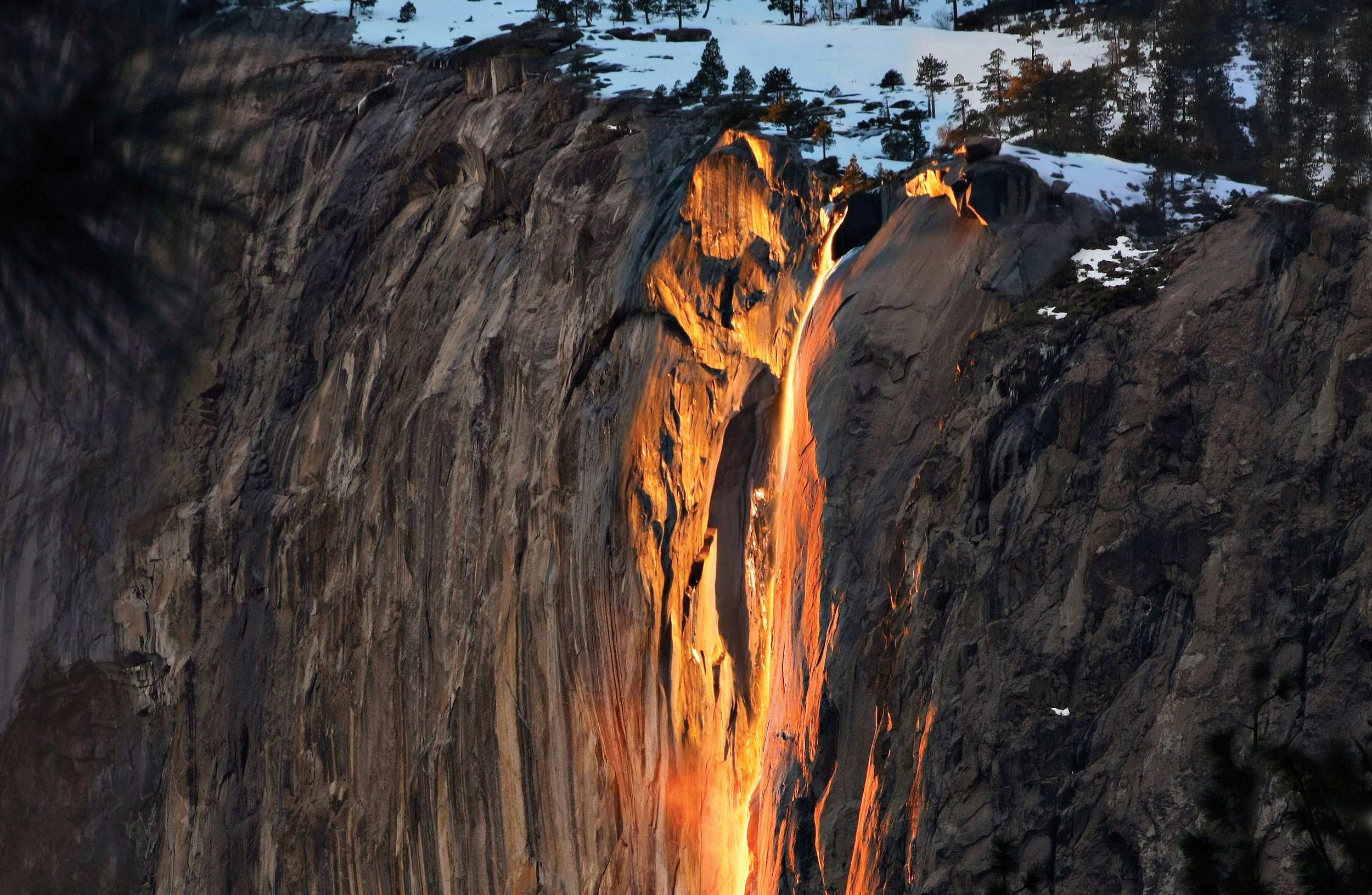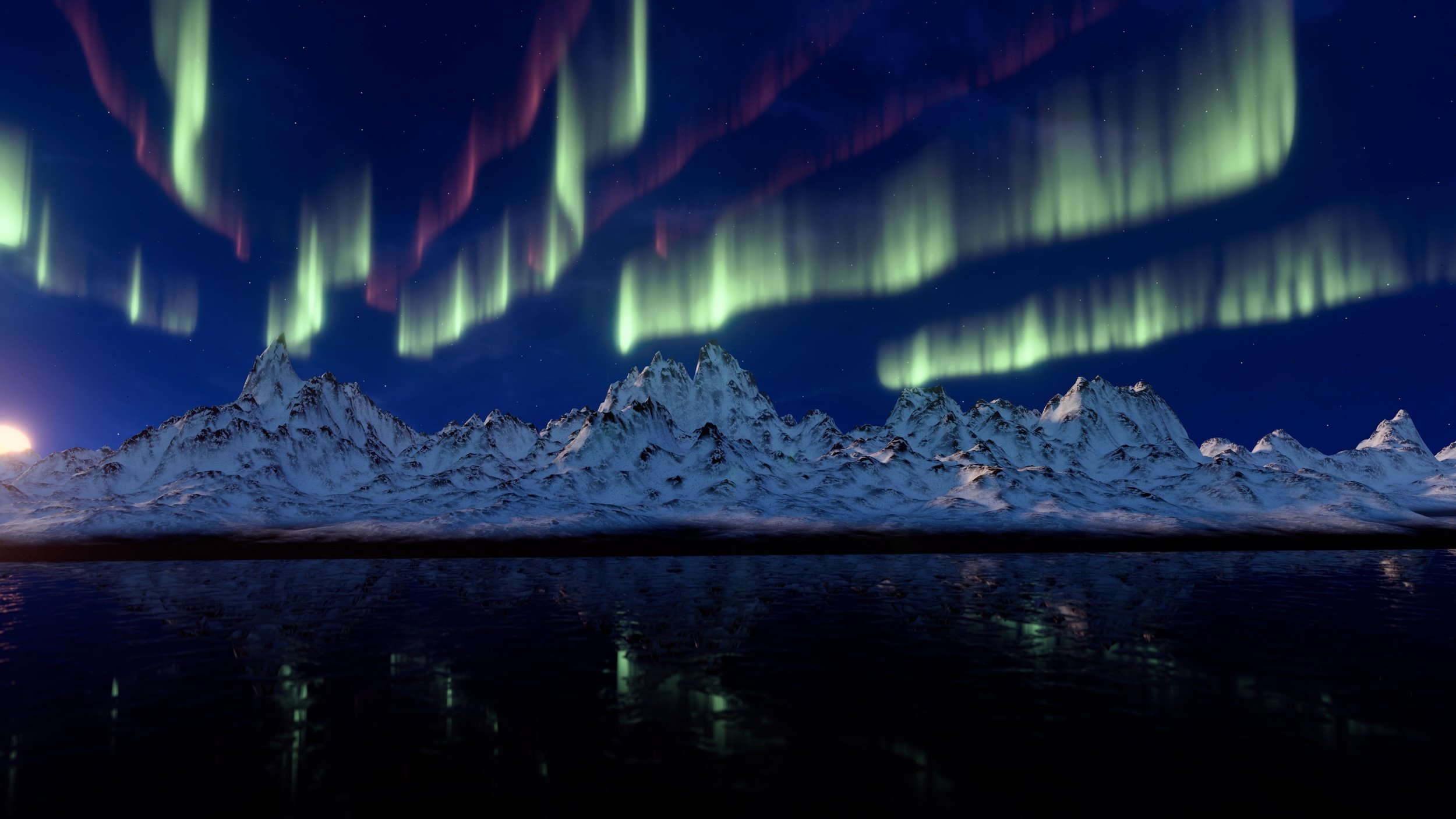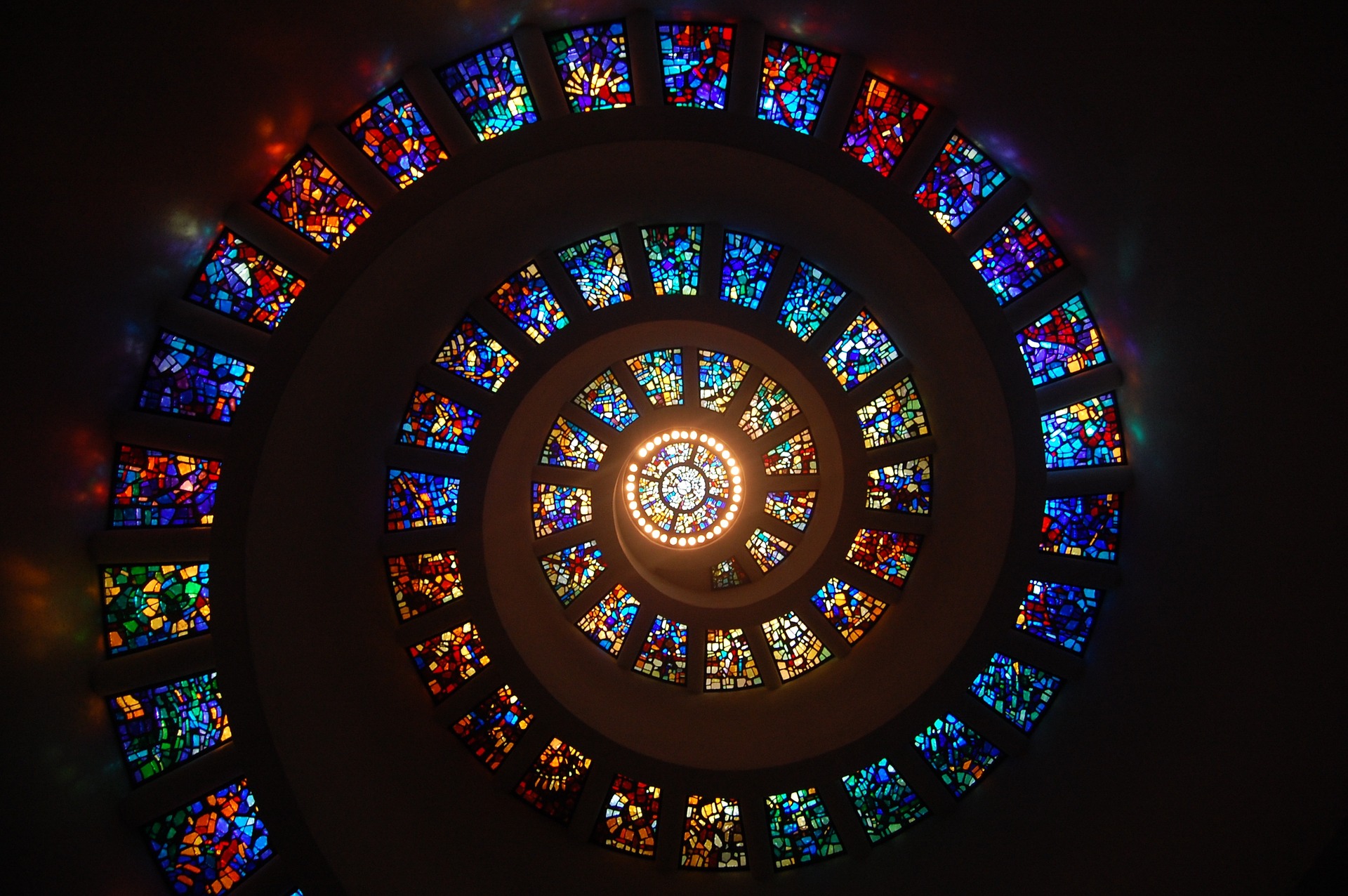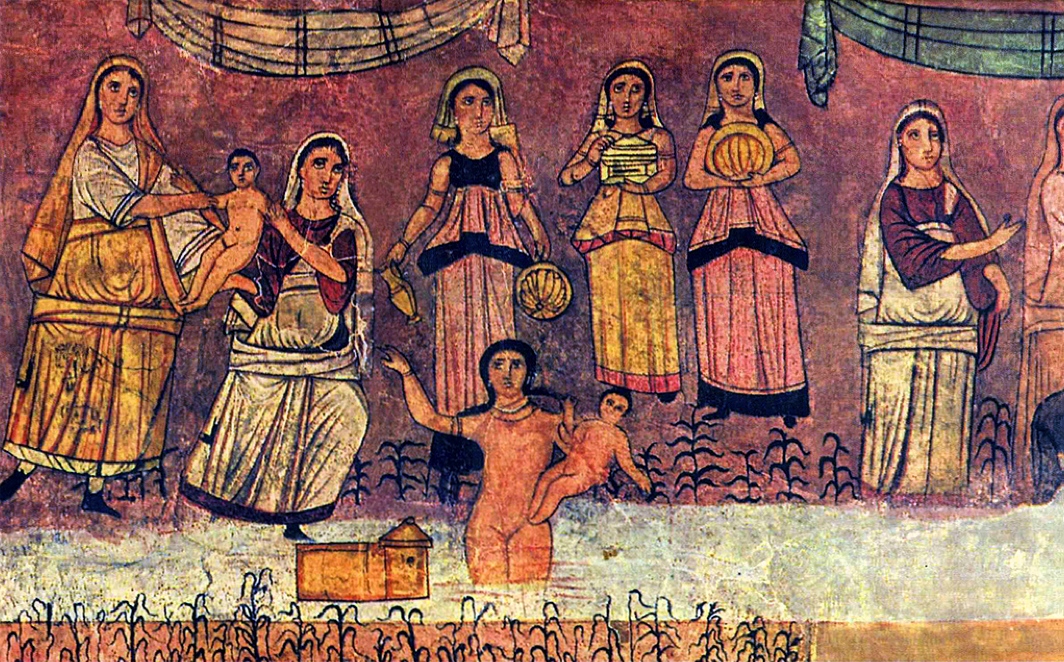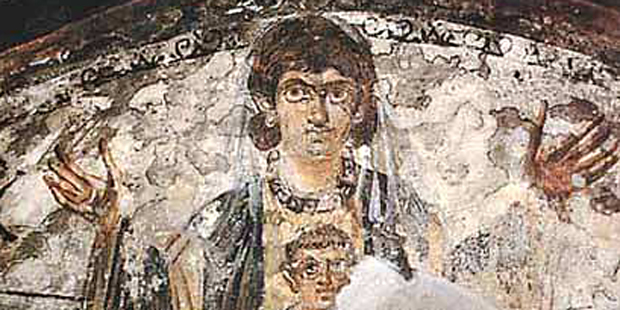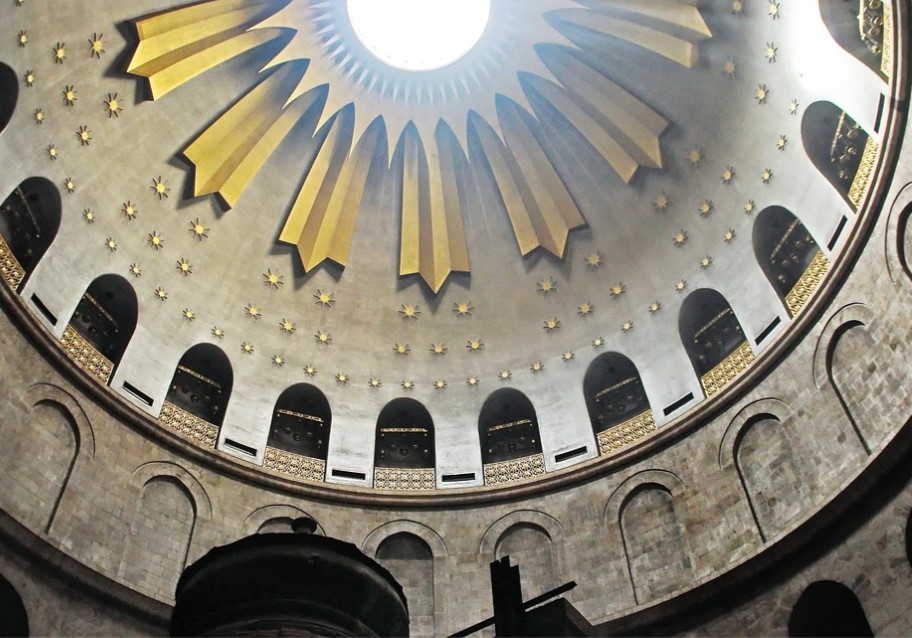The Natural Is Supernatural
The “waterfall of fire” at Horsetail Falls at Yosemite National Park in California, USA. Photo credit: Wcwoolf | CC By-SA 4.0 and Wikipedia (cropped). This happens only when certain conditions are met: the right time (in February 17 - 19 of each year, the sun sets between two mountains, casting sunlight in a narrow band on the waterfall); the right weather (no clouds block the sunlight); the right temperature (it must be warm enough to melt the snow); and the right weather just before (enough snow must have fallen).
Christian tradition holds that God intervenes in particular ways in the world, and that while God made the universe to operate by natural, scientifically observable laws, He gave it its own creaturely freedom. Personal beings like humans and angels have moral agency and free will. And in the rest of the natural world, perhaps quantum mechanics discerns a certain degree of non-deterministic freedom. In Christian thought, Jesus uniquely recovered the role of humans as partners with God in transfiguring God’s creation by God’s divine light.
Messages and Essays on the Natural as Supernatural
Weird Coincidences, Supernatural Events, Funny Feelings - Is That You God? A message about experiencing unusual things, and how to interpret them.
Desires, Beliefs, and How We Know Truth: Why Do We Sometimes Not Desire Jesus? A presentation about how human desire for beauty, goodness, and truth is suggestive but needs help, and how belief systems present how we might know them.
The Trinity: Can Other Gods Be Personally Known? observes that Jewish monotheism allowed for at least a binitarian God who was both transcendent and immanent at the same time
Other Resources on the Natural as Supernatural
C.S. Lewis, "The Weight of Glory," from his book The Weight of Glory and Other Addresses
C.S. Lewis, Mere Christianity, especially part one, reasoning from good and evil, and our experience of ourselves
Eugene Wigner, The Unreasonable Effectiveness of Mathematics in the Natural Sciences. UPenn, 1960. See also David Gelernter. Stephen C. Meyer, David Berlinski, David Gelernter, and Peter Robinson, Mathematical Challenges to Darwin’s Theory of Evolution. Discovery, Jul 24, 2019. See also Jennifer Kabbany, Famed Yale Computer Science Professor Quits Believing Darwin’s Theories. The College Fix, Jul 30, 2019. Re: David Gelernter
Michael Polanyi, Personal Knowledge: Towards a Post-Critical Philosophy. University of Chicago Press | Amazon page, Aug 1974. See also a summary of his Critical Realist Epistemology.
T.F. Torrance, The Grammar and Ground of Theology. Fuller Theological Seminary, 1981. An audio recording of lectures given at Fuller Seminary, excellent resource on the interaction between scientific and theological pursuits
T.F. Torrance, The Grammar and Ground of Theology lecture 1. Fuller Theological Seminary, 1981. An audio recording. Torrance discusses three changes in cosmological knowledge that affected science, epistemology, and theology. He discusses the dualist to unitary view, and the shift from a Newtonian closed system to dynamic-relational-contingent system.
T.F. Torrance, The Grammar and Ground of Theology lecture 2. Fuller Theological Seminary, 1981. An audio recording. The change from the priority of reason over belief, back to the priority of belief over reason
Francis Collins, The Language of God: A Scientist Presents Evidence for Belief. Free Press | Amazon page, Jul 2007 and video, Dec 21, 2010.
David Bentley Hart, Mysteries of Consciousness. First Things, Aug 20, 2010.
Alister McGrath, Surprised by Meaning: Science, Faith, and How We Make Sense of Things. Westminster John Knox Press | Amazon page, Feb 2011.
Frank Wilczek, Why Is the World So Beautiful? On Being, Apr 28, 2016.
Robert Epstein, The Empty Brain. Aeon, May 18, 2016. The brain does not process information, retrieve knowledge or store memories; it is not a computer; encounters are irreducibly personal
Jon Miltimore, World-Famous Scientist: God Created the Universe. Intellectual Takeout, Jun 6, 2016. Physicist Michio Kaku: “I have concluded that we are in a world made by rules created by an intelligence. To me it is clear that we exist in a plan which is governed by rules that were created, shaped by a universal intelligence and not by chance.”
N.T. Wright, If Creation is Through Christ, Evolution is What You'd Expect. BioLogos, Apr 24, 2017. Short, excellent 4 minute reflection on Colossians 1 and Genesis 1.
Carol Kuruvilla, Stephen Colbert On How He Returned To Catholicism After Being An Atheist. Huffington Post, Nov 16, 2018. On the mystery of gratitude
Lee Billings, Atheism Is Inconsistent with the Scientific Method, Prizewinning Physicist Says. Scientific American, Mar 20, 2019. “In conversation, the 2019 Templeton Prize winner does not pull punches on the limits of science, the value of humility and the irrationality of nonbelief”
Anderson Cooper, Full Interview of Stephen Colbert. CNN, Aug 14, 2019. From 20 min mark, explores grief, loss, gratitude, and God’s love.
Mari Joerstad, The Hebrew Bible and Environmental Ethics. Cambridge University Press | Amazon page, Sep 2021. This is a unique study of the way Scripture personalizes the non-human creation such as land, trees, rivers and waters, etc. Joerstad makes excellent observations and draws out very helpful ethical implications as to God’s love for the creation into which humans are called to participate.
Ergun Lafli, Nature in the Byzantine Art of Anatolia. A public lecture on September 5, 2021 on Heybeliada, Istanbul, Turkey. Academia, Sep 5, 2021.
Stephen Freeman, When Miracles Ceased. Glory to God for All Things | Ancient Faith, May 10, 2023.
David Brooks, The Shock of Faith: It’s Nothing Like I Thought It Would Be. New York Times, Dec 19, 2024. On epiphanies, including epiphanies in nature, that led to the pursuit of God, on desire and longing, and the view of humans as co-creators with God. “I experienced an acceleration of those moments. This time they were not mere spooky experiences, but illuminations — events that tell us about the meaning of life and change the way we see the world…. When religion is seen as belief, then the believer lives on a continuum between belief and doubt. But when religion is seen as a longing, then the believer lives on the continuum between intensity and apathy… I’ve heard Christians say that our job is to take our hands off the wheel and let God drive. Or as John Calvin put it, “The only haven of safety is to have no other will, no other wisdom, than to follow the Lord wherever he leads.” In the face of that, I find the Jewish concept of “co-creation” is stubbornly baked into my mind. It is our human will, energy and creativity, working within God’s, that matter.”
How our desires for beauty, goodness, and love are part of how God leads us to Jesus, see Desire: Jesus Leads Us to True Beauty
How our moral sense tells us that something is wrong, including wrong with us, see Evil: Jesus Heals the Evil in Human Nature
How our wondering about ourselves is corroborating evidence that the Christian story is true, see Proof Via Human Personhood
How God can be wholly good despite human evil, see God’s Goodness: The Trinity
The Supernatural: Topics:
This section on the Supernatural is organized as follows: The Natural highlights how creation itself is miraculous, since there is something rather than nothing; and creation points in its own way to God. General Accounts highlights how people who are not Christians have observed supernatural phenomena. Christian Accounts spotlights specifically Christian experiences and interpretations of the supernatural. Making Sense explores different ways of understanding supernatural events. Biblical Israel examines how the origins, literature, and early history of Israel point to a supernatural origin. The Decisive Miracle considers Jesus to be the supreme miracle of a God who reveals God’s own self.

